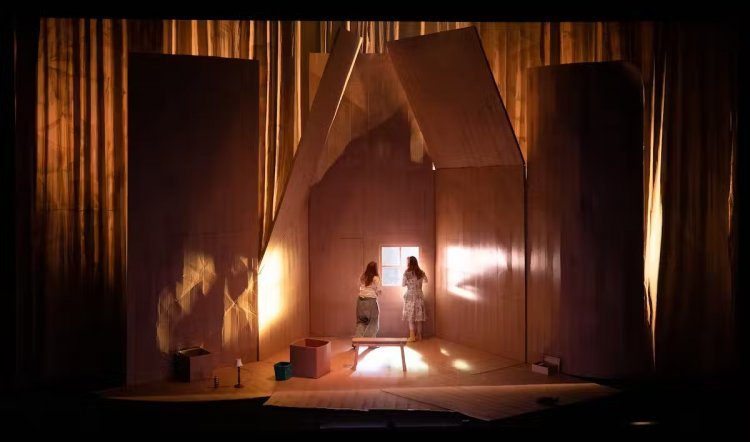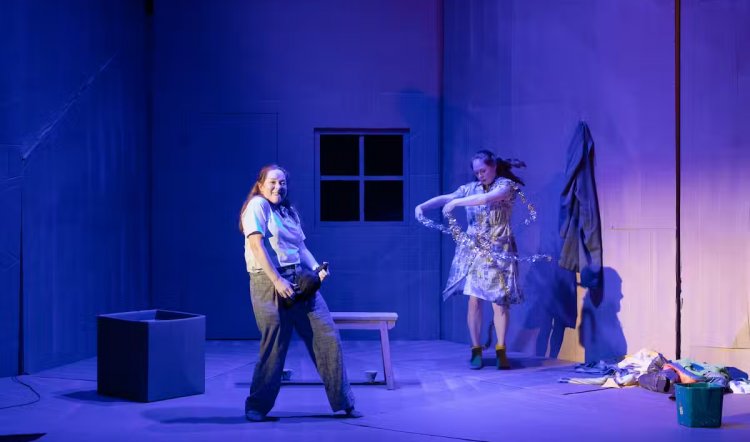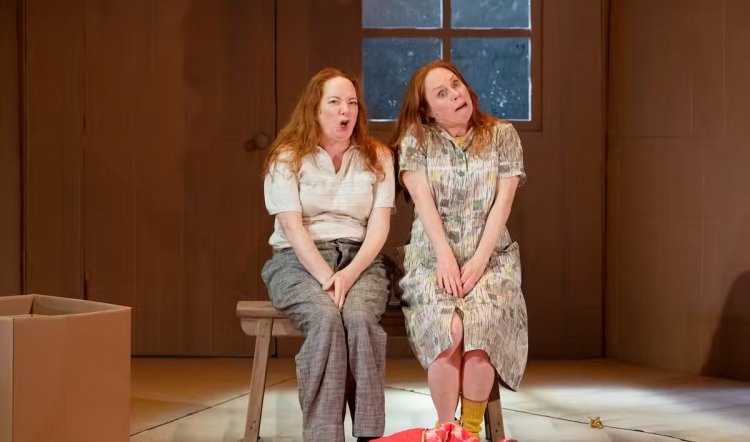
DIRTY BIRDS
DIRTY BIRDS, Black Swan State Theatre Company, Heath Ledger Theatre, State Theatre Centre, Perth. Until December 10. Photography by Daniel J Grant
Two lookalike sisters remain safe but stuck in their own tightly sealed world. Is it an imagined place, a cardboard cubby house of their own making or a derelict building? Perhaps they are on the verge of eviction, hinted at by a sheaf of envelopes stuffed into an unseen letterbox.
The sisters seem poised for action that is endlessly delayed. Mary, who never ventures out, arranges two teacups as she waits for Martha, who goes out and always comes back, “and there’s the pity.”
If there’s an absurdist whiff of Sartre’s Huis Clos and Beckett’s Happy Days in this scenario, it’s probably a deliberate ploy by co-writers and real-life sisters Mandy and Hayley McElhinney. That Dirty Birds is their first writing collaboration, and also the first time they have appeared together on stage, is surprising.
Both have long lists of credits in TV, film and theatre, from Mandy’s roles as Rhonda (think Balinese lover Ketut) in AAMI insurance ads, in Home and Away, Wakefield and The Glass Menagerie to Hayley’s roles in Mystery Road: Origin, The Babadook and Doctor Doctor.
As Mary (Mandy) and Martha (Hayley), the pair display a dramatic rapport that has been honed, one suspects, during years of dress-ups and imaginative play between siblings growing up in a remote part of Western Australia. The sisters have described drawing on the family banter of their Irish-born dad, and they slip easily into Irish brogue for the early scenes (accents perfected by voice and accent coach Jean Goodwin.)

Lookalike siblings are an intriguing puzzle in themselves; not alike enough to be mistaken for twins but eery mirror images in their mannerisms, hair colour and posture.
The McElhinneys exploit that visual aspect in their roles as sisterly misfits. Dowdy cardigans and ill-fitting coats are interchangeable, their unruly mops of red hair mirror each other and even their grimaces are identical.
Mary and Martha while away their time in ways that imaginative children do, performing skits that wildly swing between eras and accents - from rumour-mongering crones reminiscent of James Joyce’s Ulysses to playing husbands and wives in 1950s America, all cocktail parties and condescending husbands.
Another scene induces a frisson of fear a la Hitchcock’s Psycho. A black crow hits the front door; its corpse is brought inside and hung on the wall like a sinister crucifix until the sisters decide to give it a proper funeral. Humour erupts as the pair’s embalming ritual involves a can of WD40.
Dirty Birds is a bleakly funny, sharp-edged double act; the comic touches are highlights on a darker canvas. The sisters drop oblique hints about the need to hide themselves in a box, and they act out the grind and thrust of fornicating adults. Mary is anxious about seasonal forces that lie beyond the door, menacing extremes of snow and heat conjured exquisitely by Paul Jackson’s lighting effects and composer Rachael Dease’s sound design. Seeing Dirty Birds on a night when half the northern suburbs of Perth were ablaze was an uncomfortable reality check.

Black Swan’s artistic director Kate Champion adopts a collaborative approach to this exciting new play, but the carefully articulated moves, some resembling dance choreography, bear the hallmarks of Champion’s dance background.
Most powerful is Bruce McKinven’s brilliant set, a small sparse domestic interior that later reveals its full dimensions and fragile shape modelled on an object that has sat on stage. The ambitious staging has posed a few problems during the season, but when it works it is a sublime metaphor for the sisters’ fragile state.
The night I saw Dirty Birds, a temporary staging glitch meant a short blackout and stage reset before the sisters regrouped for the “proper” ending. Yet the glitch version struck me as an equally plausible denouement. Many of the play’s elements – obsessive role play, consoling rituals and two-in-one identities – could represent an individual woman’s struggle with sanity, and the need to free herself from a persistent “other” voice.
Then again, Dirty Birds owes its best moments to instinctive rapport and rich repartee between two talented sisters. It left me thinking that you can never have too many McElhinneys.
Comments
Leave a Comment
Enter your username and password to comment. Don't have a username? Register now.



-c444x300.jpeg)
Be the first to leave a comment below